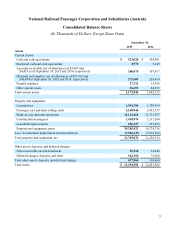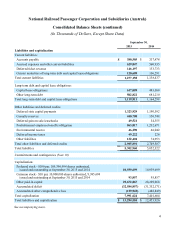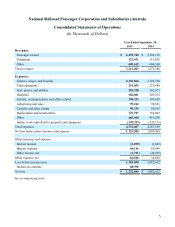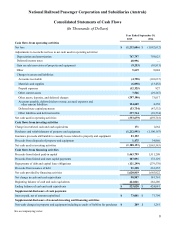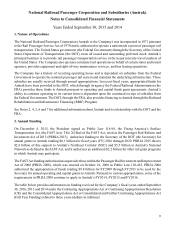Amtrak 2015 Annual Report Download - page 15
Download and view the complete annual report
Please find page 15 of the 2015 Amtrak annual report below. You can navigate through the pages in the report by either clicking on the pages listed below, or by using the keyword search tool below to find specific information within the annual report.National Railroad Passenger Corporation and Subsidiaries (Amtrak)
Notes to Consolidated Financial Statements (continued)
3. Basis of Presentation and Summary of Significant Accounting Policies (continued)
13
included in “Other liabilities” in the Consolidated Balance Sheets. The liability was less than $0.1 million
as of September 30, 2014.
On November 2, 2012, in conjunction with the Pennsylvania Economic Development Financing Authority
(PEDFA) Garage Bond reissuance (see Note 6), Amtrak entered into an interest rate swap arrangement. As
of September 30, 2015, the fair value of the PEDFA Garage Bond interest rate swap derivative contract was
a liability of $0.4 million, which is included in “Other liabilities” in the Consolidated Balance Sheet. The
fair value of the derivative contract was an asset of $0.5 million as of September 30, 2014, which was included
in “Deferred charges, deposits, and other“ in the Consolidated Balance Sheet.
Property, Equipment, and Depreciation
Except as described below, property and equipment owned by the Company are carried at cost and depreciated
using the group method of depreciation (group method) in which a single composite depreciation rate is
applied to the gross investment in a particular class of property or equipment, despite differences in the service
life or salvage value of individual property units within the same class. This excludes computer equipment
and software, which are stated at cost and are individually depreciated on a straight-line basis over their
estimated useful lives, which are generally five to ten years. Properties held under capital leases and leasehold
improvements are depreciated over the shorter of their estimated useful lives or their respective lease terms,
and the related depreciation expense is reported within “Depreciation and amortization” in the Consolidated
Statements of Operations. Land is carried at cost.
For assets depreciated under the group method, upon normal sale or retirement, the cost less the net salvage
value is charged to “Accumulated depreciation” in the Consolidated Balance Sheets and no gain or loss is
recognized. Gains or losses for assets under the group method related to significant premature retirements
of depreciable property and the disposal of land are recorded as gains and losses in the Consolidated Statements
of Operations at the time of occurrence. There were no significant premature retirements of depreciable
property or disposals of land for which gains or losses were recorded in FY2015 and FY2014.
Amtrak periodically engages an outside civil engineering firm with expertise in railroad property usage to
conduct a study to evaluate depreciation rates for assets subject to the group method. In addition to the
adjustment to group depreciation rates because of periodic depreciation studies, certain other events might
occur that could affect Amtrak’s estimates and assumptions related to depreciation. Unforeseen changes in
operations or technology could substantially alter assumptions regarding Amtrak’s ability to realize the return
on its investment in operating assets and, therefore, affect the amounts of current and future depreciation
expense. Because group method depreciation expense is a function of analytical studies made of property
and equipment, subsequent studies could result in different estimates of useful lives and net salvage values.
If future group method depreciation studies yield results indicating that assets have shorter lives because of
obsolescence, physical condition, changes in technology, or changes in net salvage values, the depreciation
expense for assets under the group method could increase. Likewise, if future studies indicate that assets
have longer lives, the depreciation expense for assets under the group method could decrease.
Construction-in-progress is stated at cost and includes direct costs of construction and interest expense
capitalized during the period of construction of major facilities, locomotives, and passenger cars.
Construction-in-progress is transferred to property and equipment when substantially all the activities


